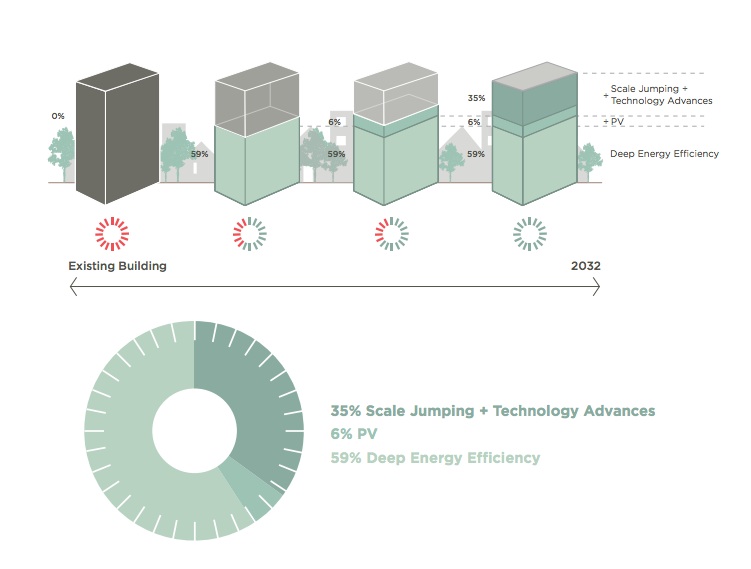The District of Columbia has more green buildings than other large U.S. cities on a per capita basis, according to the 2012 Green Building Report. D.C.’s policies have made it a leader in highly efficient building construction and renovation.
New goals will likely prompt the District to raise the efficiency bar even higher. To help guide policies for a new era of green design, D.C.’s Department of the Environment commissioned a study to assess costs and benefits associated with net zero energy, net zero water, and Living Buildings.
The Net Zero and Living Building Challenge Financial Study: A Cost Comparison Report for Buildings in the District of Columbia was conducted by International Living Future Institute, New Buildings Institute, and Skanska. The team’s analysis identified incremental cost premiums for deep energy and water conservation as well as for photovoltaic and water reuse systems that would bring a project to net zero.
The cost premium for energy efficiency was 1%-12% depending on building type, and rose to 5%-19% for net zero energy. “If the owner has sufficient tax appetite, tax credits and renewable energy credits make the return on investment approximately 30%, whereas the return on investment for energy efficiency alone was in the range of 5-12%,” the report says.
Read the full report at: http://newbuildings.org/net-zero-living-building-challenge-financial-study
Related Stories
Codes and Standards | Dec 10, 2019
Utilities rolling out more grid-interactive efficient building programs
Focus is on energy savings and demand flexibility.
Codes and Standards | Dec 9, 2019
Canada’s Zero Carbon Building Standard reports first 10 certifications
Projects include new and existing offices, schools, and warehouses.
Codes and Standards | Dec 6, 2019
New research examines flood mitigation policies in the U.S.
Thirteen states or cities have adopted effective measures; some restricting development in vulnerable areas.
Codes and Standards | Dec 5, 2019
USGBC unveils vision for LEED Positive
Roadmap will lay foundation for a future LEED that is regenerative.
Codes and Standards | Dec 5, 2019
Report shows reducing embodied carbon can save money and help mitigate climate change
Embodied carbon now accounts for 11% of global greenhouse gas emissions.
Codes and Standards | Dec 5, 2019
Dubai, London and New York are 2019’s ‘Construction Mega Cities’
From 2007 to 2025, GlobalData expects the cities’ combined gross domestic product (GDP) to increase by more than US$8 trillion to US$20.4 trillion.
Codes and Standards | Dec 2, 2019
New GBCI certification recognizes expertise in sustainability
Provides third-party verification of competency to ‘making the world more economically, socially, and environmentally sustainable.’
Codes and Standards | Dec 2, 2019
New tool allows users to learn how to reduce embodied carbon
Calculator delivers first digitized EPDs.
Codes and Standards | Dec 2, 2019
Trade group challenges St. Petersburg, Fla., ordinance on construction contract mandates
Legality of requirement to hire apprentices, disadvantaged workers at issue.
Building Owners | Dec 2, 2019
What building owners and AEC teams need to know about New York’s Climate Mobilization Act
On April 18, 2019, the New York City Council passed the Climate Mobilization Act, a suite of laws aimed to meet the city’s commitment to achieving carbon neutrality by 2050.

















